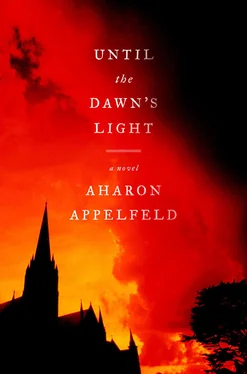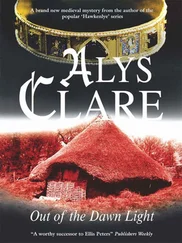Along the way she met decent people who helped her and put her up in their homes, and bullies who mistreated her. Against the bullies Blanca struggled with all her might, scratching and cursing. One night she fought off a drunken peasant, biting his arm and hissing at him, “If you touch me, I’ll murder you.” The peasant panicked and let her go.
I have to keep going, she said to herself, and did so. The winter winds dulled her fear and bolstered her courage. She felt strength in her legs. Sometimes she would stop next to a stream, wash her face, and immediately sink down into the grass and fall asleep. Sometimes a sheep or colt would emerge from the undergrowth. In that green wasteland they looked like hunted creatures to her, running away from the arms of the oppressor, as she was. For a moment they would look at each other and try to draw near, but in the end each would go his own way, as though agreeing that they would be better off alone.
Sometimes she would happen upon a Jewish peddler. He would tell her about the surrounding villages, and she would ask him how to reach a Jewish inn. These thin and unpleasant Jews were her friends now, and she trusted them and bought matches and supplies from them. The life she had left behind now seemed to her like the abandoned ruins she encountered on her way: barren and full of damp darkness.
Then a heavy snow began to fall, and Blanca was fortunate enough to find a warm and hospitable Jewish inn.
“My parents were born not far from here, and in their youth they moved to Austria,” she told the owner. “They didn’t observe the tradition, but I read the stories of the Hasidim that were collected by Martin Buber, and I would like to see Hasidim close up.”
The innkeeper smiled. She had never heard of Martin Buber, but as for Hasidim, “All of us here are Hasidim,” she said.
“And where does the Tsadik live?”
“Not far away, in Vizhnitz.”
“I didn’t know I was so close to him.”
The innkeeper didn’t know how to behave with her strange guest. She had seen assimilated Jews in her lifetime, but she had never met an assimilated Jew who traveled to see the Tsadik.
Although Vizhnitz was not far off, the way there was hard and strewn with impediments. Gendarmes lay in wait at every crossroad, and thugs gathered in the entrances of taverns. But Blanca was no longer afraid. A powerful resentment seethed within her and filled her arms with strength. For some reason it seemed to her that if she reached Vizhnitz, the snarl of her life would become untangled and she would be set free.
But Blanca’s strength did not always sustain her. She was raped once, and once she was beaten by an old peasant who suspected that she had stolen eggs from his chicken coop. Her body bruised, her arms scratched, she would sink down into the grass and imagine that Otto was waiting for her by the river. This was a new delusion, and in her darkness she would lie for hours without moving. The Prut River flowed in fierce currents in that area, and its rapids were thrilling. More than once she said to herself, I’ll jump into the water and disappear . But the desire to see Otto again drew her away from that desperate yearning. To Vizhnitz, she would repeat to herself, like a drowning man grasping a log.
Blanca imagined the way to Vizhnitz as a long, illuminated tunnel. At the beginning of it there was a ritual bath where people immersed themselves and were purified. After they were purified, they put on linen garments and advanced to the next stage. At the next stage they sat in a secluded area until their souls were emptied of their dross and they no longer remembered anything. From there the tunnel twisted and turned, but walking in it was not difficult.
One night Blanca found herself standing near a church. It was a village church, and two carved crucifixes stood in the courtyard. At first it seemed like a tranquil place, but then Blanca saw that the figures on the cross were not looking at her with affection. She was about to do what she had been in the habit of doing recently: slipping away. But this time, for some reason, her legs stopped her. She gathered some twigs and, without thinking about it, placed them next to the crucifixes. Then she lit a match and brought it close to the twigs. The twigs caught fire and raised a fine flame. She quickly stretched out her arms and warmed her cold hands.
For a long while Blanca stood and looked at the small fire, which gave off heat and a pleasant scent. The warmth seeped into her limbs, and her fingers and toes thawed out. Now she remembered her friend Sonia clearly, and how she had longed to go to her mother’s hometown. Her strong face would soften when she spoke about Kolomyja, a place where she had never been. A few days ago Blanca had asked one of the peddlers whether Kolomyja was far away. He had given her a long and intricate answer, and then summed it all up by saying, “It’s not far, but you’d be better off not putting yourself in danger during the winter. The winter is a time of troubles, and a person is better off if he sits at home and doesn’t wander on the roads.” Blanca stared at him, trying to absorb the meaning of his words. But the peddler’s tired face expressed only the fatigue of his years. Blanca absorbed that fatigue more than his convoluted explanations.
Blanca added some more twigs, and the fire flared up again. Now the heat spread, and vapor rose from her damp clothes. For the first time after many days of wandering, a vision of Otto appeared before her. First it seemed to her that he was standing and looking out the window of the orphanage, as he used to do, but a second glance showed her that he had been forgotten on the balcony. He was asking for help, and no one was answering him. Blanca was so alarmed by the clarity of this vision that she didn’t notice that the flames had spread to the figures on the crucifixes and had taken hold of them. With a quick movement she was about to remove the kerchief from her head and put out the fire, but her hands froze and she didn’t do anything. The flames twisted up and embraced the crucifixes, quickly spread to the railing in front of the church, and from there climbed up to the doorpost and enveloped the beams. Blanca stepped back and then turned to go away. The night was dark and quiet, and the burning church lit up the sky. Only later, when the fire was already at its full strength, were the peasants called to help put it out.
“Fire has come down from heaven!” they shouted with dread. They tried to put out the fire, but it was too late.
That night Blanca found an abandoned barn and slept restfully there. When she awoke the next morning and remembered that she had set fire to the church, she wasn’t frightened. It seemed to her that she had done an important thing and that from now on the roads would be open before her. Spite mingled with pleasure washed over her.
After another few days of wandering, Blanca set fire to another small church. Once again she gathered twigs and arranged them. The bonfire burned and warmed her hands. Then she watched as the fire spread and took hold of the church walls. This time the act of burning was accompanied not only by malicious pleasure but also by a kind of satisfaction; she had managed to deceive her pursuers, and from now on they would be busy putting out fires and not chasing after her.
And so Blanca continued to wander on that high plateau. The population was sparse, and only rarely would an abandoned horse or a lost cow emerge from the underbrush. Every time the desire to burn down a church arose in her, she would go and look for one. If she saw a church by daylight, she would say to herself, Tonight I’ll burn it down . Now she did it without resentment or pleasure, but like a person obsessed.
Читать дальше








![Traudl Junge - Hitler's Last Secretary - A Firsthand Account of Life with Hitler [aka Until the Final Hour]](/books/416681/traudl-junge-hitler-s-last-secretary-a-firsthand-thumb.webp)



